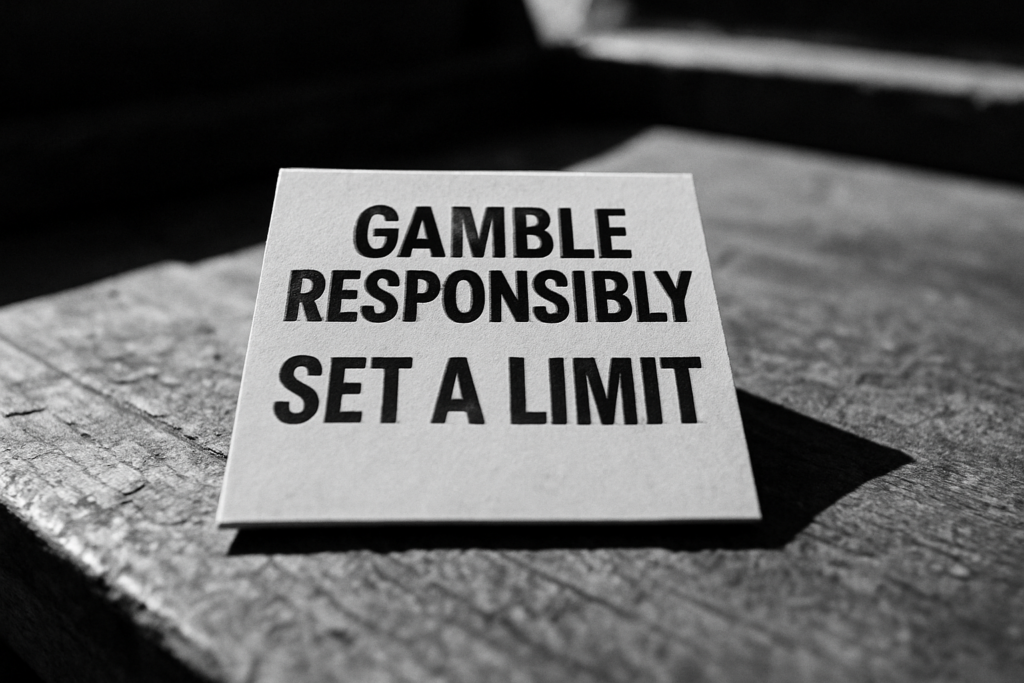Understanding Responsible Gambling Practices
Responsible gambling practices ensure that players engage with gambling activities safely and sustainably. They aim to minimize harm and promote a balanced approach to entertainment.
What Is Responsible Gambling?
Responsible gambling refers to policies and behaviors designed to protect individuals from gambling-related harm. These include providing tools and resources for self-control, encouraging informed decisions, and ensuring transparent operations. Operators adopt measures like deposit limits, cooling-off periods, and self-exclusion programs to help players manage risks.
- Player Protection: Safeguards such as age verification and account limits protect vulnerable groups from harm.
- Informed Decision-Making: Transparent odds and risk disclosures enable players to make educated choices.
- Accessibility to Support: Assistance features like helplines and counseling services ensure players can seek help quickly.
- Self-Regulation Tools: Features like bet limits, playing time reminders, and exclusion options enhance personal accountability.
- Fair Gaming Practices: Adhering to fair gaming standards builds trust and ensures all activities comply with regulations.
Implementing these principles fosters a positive gambling environment while aligning with industry growth objectives.
Industry Trends Driven by Responsible Gambling
Responsible gambling practices are transforming the industry by influencing core trends that prioritize player safety and trust. These trends reflect the sector’s commitment to ethical growth and sustainable operations.
Adoption of Technology for Safer Gambling
Technology integration supports safer gambling experiences by providing tools to identify and mitigate risks. Data-driven algorithms monitor player behavior to detect signs of problematic gambling, enabling timely interventions. Artificial intelligence facilitates real-time monitoring and personalized alerts, promoting timely support for at-risk individuals. For example, AI systems flag unusual spending patterns or extended gameplay sessions.
Mobile apps and platforms now offer self-exclusion features and spending trackers. Operators implement biometric verification to confirm user identities, tightening controls for underage gambling. Blockchain enhances transparency in transactions, reducing fraudulent activities and ensuring fair play.
Prominent Policies and Regulations
Governments and industry bodies adopt stringent policies to reinforce responsible gaming. Age restrictions and player verification processes prevent unauthorized access to gambling platforms. Mandatory self-exclusion programs allow users to block access to gambling for specific periods, aiding in behavioral control.
Updated advertising standards restrict targeting vulnerable individuals, ensuring marketing aligns with ethical guidelines. Financial caps on deposits and bet limits reduce financial risks for players. Regulation of gaming operators enforces accountability, requiring consistent audits and compliance with fair play standards.
Legislation like the Gambling Act in the UK mandates operators to integrate harm prevention tools. In regions like Canada and the US, state-specific laws increasingly emphasize player protection, reflecting coordinated efforts to elevate safety.
The Role of Operators and Stakeholders

Operators and stakeholders play a vital role in advancing responsible gambling practices across the gambling industry. Their actions directly influence the implementation of safeguards and the promotion of ethical gaming environments.
Strategies Adopted by Gambling Companies
Gambling companies implement targeted strategies to minimize harm and promote responsible play. They deploy advanced tools like AI algorithms to monitor betting patterns and identify signs of problem gambling. Customized features, such as:
- deposit limits
- loss limits
- cooling-off periods
empower players to manage their habits effectively. Some operators mandate gambling literacy programs that educate customers on odds, risks, and the importance of setting boundaries.
Many companies have also elevated transparency by integrating data-driven insights through dashboards that show time spent gambling and financial outlays in real-time. Loyalty programs increasingly reward responsible play rather than high spending. By aligning player incentives with sustainable gaming behaviors, operators ensure commitment to ethical practices.
Collaboration With Advocacy Groups and Governments
To strengthen responsible gambling frameworks, operators actively collaborate with governments and advocacy organizations. Partnerships with groups like GamCare and the National Council on Problem Gambling enable the industry to shape proactive intervention models and improve access to support services. Regular stakeholder consultations refine regulatory measures and ensure alignment with real-world scenarios.
Joint campaigns with advocacy groups promote awareness programs using multiple channels, including digital platforms and social media. Governments enforce compliance by mandating technologies like identity verification or placing penalties on non-compliant operators. Operators further align with national bodies to study societal impacts and update policies, ensuring robust protections for at-risk individuals.
The Impact on Gamblers and Society
Responsible gambling practices influence individual experiences and societal perceptions, creating safer environments and promoting ethical operations. These measures align personal well-being with broader social improvements.
Benefits for Individuals
Players experience better control over their gambling behavior with tools like deposit limits, time tracking, and voluntary self-exclusion options. These assist in guarding against financial losses and emotional distress tied to excessive gambling. Transparent information about odds and risks further empowers players to make informed choices, reducing impulsive decisions.
Support services, including 24/7 helplines and counseling, offer proactive intervention for at-risk individuals. For instance, organizations like GamCare in the UK provide tailored resources to help gamblers regain stability. Enhanced digital frameworks utilizing AI monitoring detect risky patterns and encourage responsible play through personalized notifications, reinforcing healthier habits.
Positive Social Outcomes
Responsible gambling practices contribute to reducing societal harm by addressing key issues like problem gambling and its associated costs. Families and communities experience fewer repercussions, such as financial instability and strained relationships, when gamblers adopt safer habits. Data from responsible gambling initiatives suggests a decline in gambling-related societal burdens, including a reduction in public health expenditures.
These frameworks also promote a more inclusive gambling culture by protecting vulnerable populations, such as underage individuals and problem gamblers. Awareness campaigns and regulated advertising standards ensure operators market responsibly, which enhances public trust in the industry and reduces stigma around gambling. Societies benefit from the industry’s commitment to ethical values, fostering economic growth alongside social responsibility.



 Sarah Guerra – Responsible Gambling Advocate
Sarah Guerra is a leading voice in responsible gambling, advocating for safer and more ethical gaming practices as part of her role at Gamble Wise Roll. With a background in psychology and gambling regulation, she is committed to raising awareness about the importance of harm reduction strategies, self-exclusion tools, and mental well-being in gaming. Through her articles and research, Sarah educates players about setting limits, recognizing signs of problematic gambling, and making informed choices when engaging with betting platforms. She also collaborates with industry stakeholders to encourage responsible gaming policies and initiatives. Her work ensures that Gamble Wise Roll remains a champion of balanced and mindful gambling experiences, emphasizing enjoyment without risk.
Sarah Guerra – Responsible Gambling Advocate
Sarah Guerra is a leading voice in responsible gambling, advocating for safer and more ethical gaming practices as part of her role at Gamble Wise Roll. With a background in psychology and gambling regulation, she is committed to raising awareness about the importance of harm reduction strategies, self-exclusion tools, and mental well-being in gaming. Through her articles and research, Sarah educates players about setting limits, recognizing signs of problematic gambling, and making informed choices when engaging with betting platforms. She also collaborates with industry stakeholders to encourage responsible gaming policies and initiatives. Her work ensures that Gamble Wise Roll remains a champion of balanced and mindful gambling experiences, emphasizing enjoyment without risk.
